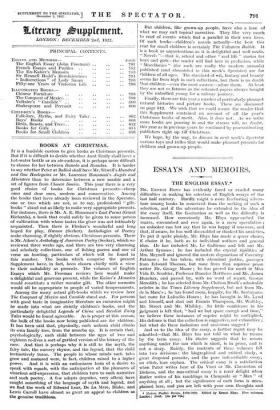BOOKS AT CHRISTMAS.
IT is a laudable custom to give books as Christmas presents. But if it is difficult to decide whether Aunt Emily shall have a hot-water bottle or an air-cushion, it is perhaps more difficult to choose for her between Romola and Rasselas. It is harder to say whether Peter at Balliol shall have Mr. Sitwell's Hundred and One Harlequins or Mr. Laurence Housman's Angels and Ministers than to determine between a new mashie and a set of figures from Chauve Souris. This year there is a very good choice of books for Christmas presents—cheap ones and dear ones, modern and conservative. Among the books that have already been reviewed in the Spectator, one or two which are not, so to say, professional "gift- books "stand out as likely to make very appropriate presents. For instance, there is Mr. A. E. Housman's Last Poems (Grant Richards), a book that could safely be given to some person of cultivation with whose tastes the giver was not intimately acquainted. Then there is Flecker's wonderful and long hoped for play, Hassan (Seeker). Anthologies of Poetry make charming, if slightly obvious, Christmas presents. There is Mr. Aiken's Anthology of American Poetry (Seeker), which we reviewed three weeks ago, and there are two very charming and scholarly collections, one of fishing poems and one of verse on hunting, particulars of which will be found in this number. The books which comprise the present Supplement have, in fact, been chosen chiefly with a view to their suitability as presents. The volumes of English Essays which Mr. Freeman reviews here would make a delightful and generous present, while the Kaiser's Memoirs would constitute a rather macabre gift. The other memoirs would all be appropriate to people of varied temperaments.
Among the many actual gift-books which we review here The Conquest of Mexico and Candide stand out. For persons with good taste in imaginative literature an excursion might be made into what are strictly children's books, and the particularly delightful Legends of China and Swedish Fairy Tales would be found agreeable. As is proper at this season, the bulk of the books now being published are for children. It has been said that, physically, each unborn child climbs its own family tree, from the amoeba up. It is certain that, psychologically, each child between the ages of two and eighteen re-lives a sort of garbled version of the history of the race. And that is perhaps why it is still to the myth, the fairy tale, the nursery rhyme, and the legend, that the child instinctively turns. The people in whose minds such tales grew and matured were, in fact, children raised to a higher power. And it is with an enthusiasm born of a desire to speak with equals, with the anticipation of the pleasures of vicarious self-expression, that children turn to such narrative and such poetry. A few adepts (mystics, very often) have caught something of the language of myth and legend, and we find the work of Edward Lear, De La- Mare, Blake, and Lewis Carroll have almost as great an appeal to children as the genuine traditions. But children, like grown-up people, have also a love of what we may call topical narrative. They like very much to read of events which find a parallel in their own lives. Of such books—children's novels actually—the best this year for small children is certainly The Velveteen Rabbit. It is a book as unpretentious as it is delightful and well made. "Novels "—that is, school and other "real life" stories for boys and girls—the reader will find here in profusion, while " Miscellanies " (for such are really the modern annuals) published (and chronicled in this week's Spectator) are for children of all ages. The standard of wit, fantasy and beauty seems far from high in such collections, but there is no doubt that children—even the most austere—adore them. At least they are not so fatuous as the coloured papers always bought by the unburned young for a railway journey.
Finally, there are this year a number of particularly pleasant natural histories and picture books. These are discussed on page 812. We wish that we could assure the reader that this Supplement contained an account of all the year's Christmas books of merit. Alas, it does not. As we write more books are pouring in and the stream will, no doubt, this year as in previous years be continued by procrastinating publishers right up till Christmas.
We hope, by the way, to discuss in next week's Spectator various toys and trifles that would make pleasant presents for children and grown-up people.






































































 Previous page
Previous page